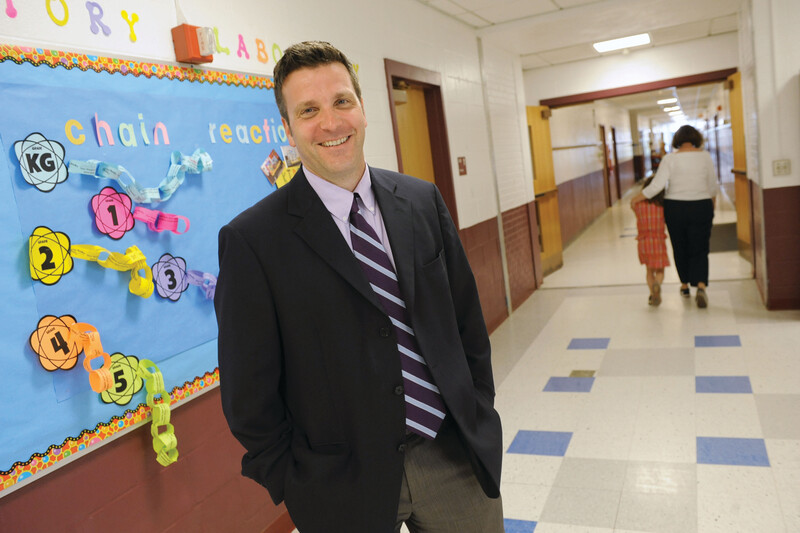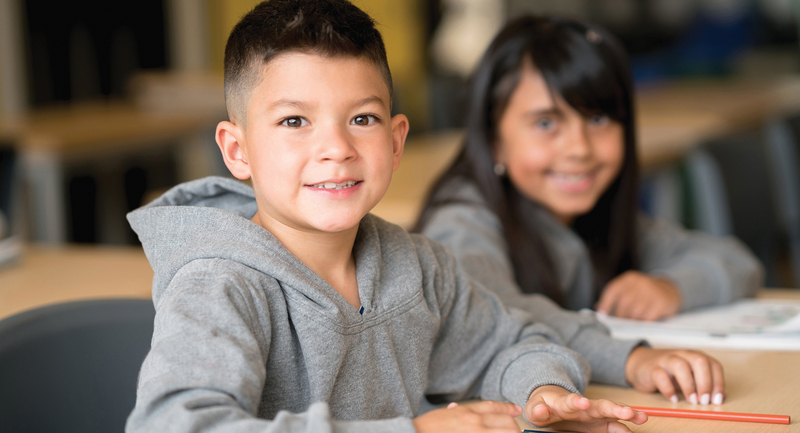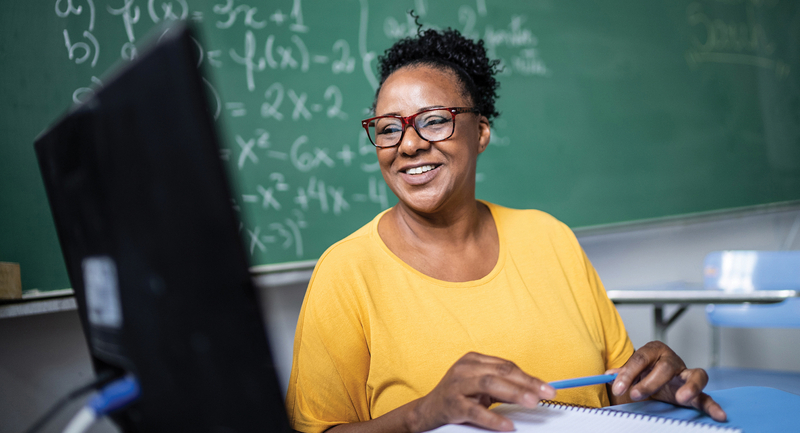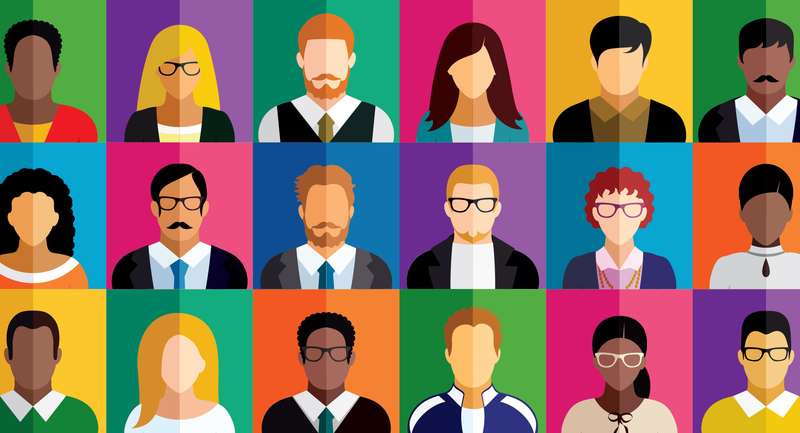The LGBTQ community in the United States is made up of more than 8 million lesbian, gay, bisexual, and transgender workers, according to UCLA's Williams Institute (Conron & Goldberg, 2020). I am one of those 8 million. This is not news for most people who know me, because I have been out for nearly 25 years.
However, as an openly gay man working in K–12 education, I have often had to find a balance when it comes to how much I share about my private life. In fact, I used to live in fear that I would lose my job as an educator because of being gay.
This past summer, the U.S. Supreme Court ruled that LGBTQ workers are protected under Title VII and cannot be fired because of their sexual orientation or gender identity (Bostock v. Clayton County, 2020). That landmark decision helped many in the LGBTQ community breathe a little easier. Yet, despite this win, some LGBTQ teachers and leaders are still at risk of losing their jobs. I've heard from educators whose district leaders, principals, or teacher colleagues have found subtle ways to ostracize or even terminate them. Some have found themselves being left out of casual conversations about weekend plans. Others have been purposely left off committees or left out of leadership opportunities. Some have been written up during walkthroughs for a lack of classroom management skills or not meeting the needs of all students, even though neither is true. And still others have received unsatisfactory observations.
One of the biggest challenges of navigating COVID-19 is the isolation and loneliness caused by social distancing. We miss being connected in person with everyone. From a mental health standpoint, many of us need to feel connected with the place we work and to the people with whom we work. But even in "normal" times, LGBTQ educators are not always fully invited into that much-needed connection.
The Cost of Living Two Lives
I have sometimes struggled to find a sense of belonging in the profession. I came out to my family in 1996, when I was 26 years old. My sexuality, however, was not something I planned to discuss as a new teacher working in an elementary school for a very authoritarian principal. I was simply struggling, like every other first-year teacher, to get my instructional sea legs: Coming out to my colleagues was the last thing on my mind.
I convinced myself that if I was careful enough, I could keep my personal life, well, personal. It worked at the time, but the constant tiptoeing around questions like "Why are you single?" and "What are you doing this weekend?" took its toll. My mental health was beginning to suffer because I felt as though I was living two lives. On one hand, I was myself, Peter. On the other, I was a closeted teacher who tried desperately to fit into heterosexual norms. I avoided uncomfortable questions with ninja-like precision. But keeping up that façade led me to drinking more at night, not sleeping well, and becoming more anxious. My symptoms were not uncommon. LGBTQ individuals are 2.5 times more likely to experience anxiety, depression, and substance misuse than their straight counterparts (American Psychiatric Association, 2017).
When I did finally come out to a few trusted teacher colleagues—mostly because of the love that my partner Doug gave me—they were not only supportive, but happy to know that I had a life outside the classroom. Later when I became a principal, I experienced an even more accepting and inclusive school community. Being authentic helped relieve some of my anxiety, at least to a point.
I found the best course of action as both a teacher for 11 years and a principal for 8, was to allow people to get to know me before telling them that I also happen to be gay. Most people who get to know me then become a bit more comfortable with that part of my identity. So yes, I have had to spend my life making sure that others are comfortable, which to be honest doesn't always sit well with me.
Subtle and Incremental Discrimination
Though I've had many supportive colleagues, I've also, unfortunately, experienced various types of discrimination. There were the more outright attacks, such as a hate blog that targeted those of us who were gay in our school district, and the smaller, but equally hurtful microaggressions, such as colleagues turning their backs on my partner when he attended school events.
All of these experiences led me to want to help other gay educators and students. In 2008, I pursued my doctorate in educational leadership. The focus of my dissertation—and now much of my career—became my first book, Dignity for All: Safeguarding LGBT Students (Corwin, 2012). Now, besides providing professional learning on instructional leadership, I explore issues related to the social and emotional well-being of students in the "Finding Common Ground" blog that I began writing for Education Week in 2011.
After leaving the principalship, I expected—or rather, hoped for—the same equal treatment that my district gave me. But I quickly learned that wouldn't be the case. I have received hate mail from religious right organizations and anonymous comments on my blog posts for Education Week accusing me of pushing my liberal ideals on children. I have been told by commenters that I am what's wrong with our country because I want schools to create "safe spaces" for marginalized students.
While on the road, even educators have made off-color comments. I remember one time as I was stepping on the stage to give a keynote to a large group of administrators, the person who asked me to be there shook my hand after introducing me and whispered in my ear, "They (the audience) may be a little quiet because they're worried you're here to talk about a gay topic." Another time, when arriving at a school district to run a workshop, I asked an administrator where the nearest restroom was. The gentleman pointed down the hall and said, "We don't have one of those transgender bathrooms."
Incidents like these have shown me that something is still deeply wrong in school cultures. If educators are supposed to be creating a safe and inclusive environment where all students can reach their full potential, we should check our biases at the door, or even better, explore why we have those biases in the first place. Schools, and education as a whole, need to be more accepting than "tolerant."
Fortunately, much of that discrimination is outweighed by the support I have received from educators like John Hattie and Jim Knight, both of whom have mentored and supported me personally and professionally. I've also received encouragement from people I have met on the road, and from others who have used social media to express their gratitude for the fact that I am out and working hard to protect the lives of marginalized students.
My Road to Better Mental Health
I'm a fairly confident person who has had a great career teaching, leading, writing, and facilitating workshops around the world. But as I mentioned, I still receive comments from time to time that set me back emotionally. We all do. No educator, gay or straight, goes through life unscathed. We can combat the negative moments by practicing better self-care.
I work hard to protect my mental health. As I have gotten older, I have realized that self-acceptance is more important than any other form of acceptance. Instead of looking for approval from others, I surround myself with family and friends who support me.
For more than two years, I have engaged in daily meditation practices for up to 30 minutes. I find that if I begin each day in a quiet space, to find some inner peace and strength, I can then go about my day practicing patience and grace, even in the face of adversity. Most mornings, just 10 minutes of meditation has helped me find ways to pause before I react in situations.
Meditation and regular exercise have been positive ways I practice self-care. But just as important is the effort that I make to connect with colleagues in the field. I have built friendships, in person and on social media, with many open-minded educators from around North America and across the world. Some of those relationships were fostered more than nine years ago and remain strong today. There is no question that this curated support network has helped me gain a stronger sense of self.
Support Your LGBTQ Colleagues
In the professional learning that I facilitate with building and district leaders, instructional coaches, and teacher leaders, I focus on collaboration and instructional leadership. Within the dialogue we build together, many times I am encouraged to bring in discussions about supporting LGBTQ and other marginalized students. But I recognize that the adults who teach these students need support, too.
As I've traveled from site to site, a number of educators have secretly shared with me that they are gay but not sure how to move forward. I encourage them to identify a few trustworthy people within their school to connect with and be able to share personal experiences with. I remember, as a young teacher myself, that I flourished in the classroom but didn't really engage with my coworkers or school community. That isolation took its toll until the moment I met friends I could truly relate with. The relationships with these colleagues changed everything for me and helped me move toward a healthier existence.
To create a more inclusive school community, we need to be intentional about our words and actions. Here are just a few ways you can support your LGBTQ colleagues.
Connect with them. When walking around our neighborhoods, we often see signs on lawns supporting one group or another. By the signs our neighbors display, we instantly feel connected to some and that we might need to work a bit harder to connect with others. This is a good rule of thumb for educators: Consider what signs you're offering to those you work with. It's very simple: Be an ally. Ask them about their partner or family just like you would your heterosexual peers. Invite them to social events. Check in on their mental health and listen nonjudgmentally when they share their experiences.
Don't be afraid to openly answer questions. As a principal, I have seen colleagues afraid to talk about what they deem to be "controversial issues." I remember one teacher I worked with who had a new 5th grade student who said, "I heard Dr. DeWitt is gay." The teacher came to me rather upset. Though she knew I was gay, she lacked the confidence to answer him in that moment. I looked at her and smiled, and said, "I am gay, and it is OK to respond, "Yes, he is gay."" If we make the questions like that of the 5th grade student seem wrong, then they will believe that being gay is wrong.
Don't be afraid to openly ask questions. A few years ago, I was working with a large group of building leaders in New Brunswick, Canada, and they began asking how they could help create a safer space for their LGBTQ students. Quite honestly, they had already been taking so many positive steps that I had to regroup a bit to help them go deeper.
Many leaders fail to do the same because they are afraid of offending those on the receiving end of such questions. It takes courage to probe deeper and seek out colleagues who can speak to their personal, direct experience. But many of us are eager to answer questions if it means that our students will be better supported. In fact, the next time you see me at a conference or a training, feel free to approach me and ask away.
Show that you care. Our job as educators is to make sure we create a safe space where all students can learn and where all teachers can teach. We need to show empathy by showing we care. Simple actions can go a long way. For example, display "safe space" stickers on your classroom or office door. Use inclusive language in staff meetings and casual conversations. Make sure there is LGBTQ anti-bullying language in board policies and student codes of conduct that communicate zero tolerance. If an incident of bullying or harassment occurs, intervene immediately and let staff know so they can lead community circles to prevent such incidents from reoccurring. Integrate LGBTQ topics into the curriculum and encourage your library media specialists to purchase age-appropriate books that include LGBTQ characters. Openly support the work of the GSA (Gay-Straight Alliance) at your school. The list goes on and on.
Make Empathy a Priority
This year, due to COVID-19 and the increasing tensions over racial injustice, we are engaging in more and more conversations about mental health. We have all experienced sadness. Many of us are reeling from the consequences of social distancing and school closures.
The truth is we have students, teachers, and leaders who've felt disconnected long before the pandemic—and they are at risk of feeling it well after a vaccine arrives. As I've learned throughout my 25 years in education, how we strengthen our mental health is through the connections we make with colleagues. Everyone deserves to be included in those connections.
*Photo caption: Peter DeWitt, shown here in 2013, says he often had to shield part of his life when he was a teacher and principal. This "doesn't always sit well with me," he says now. Photo courtesy of Lori Van Buren / Times Union.









